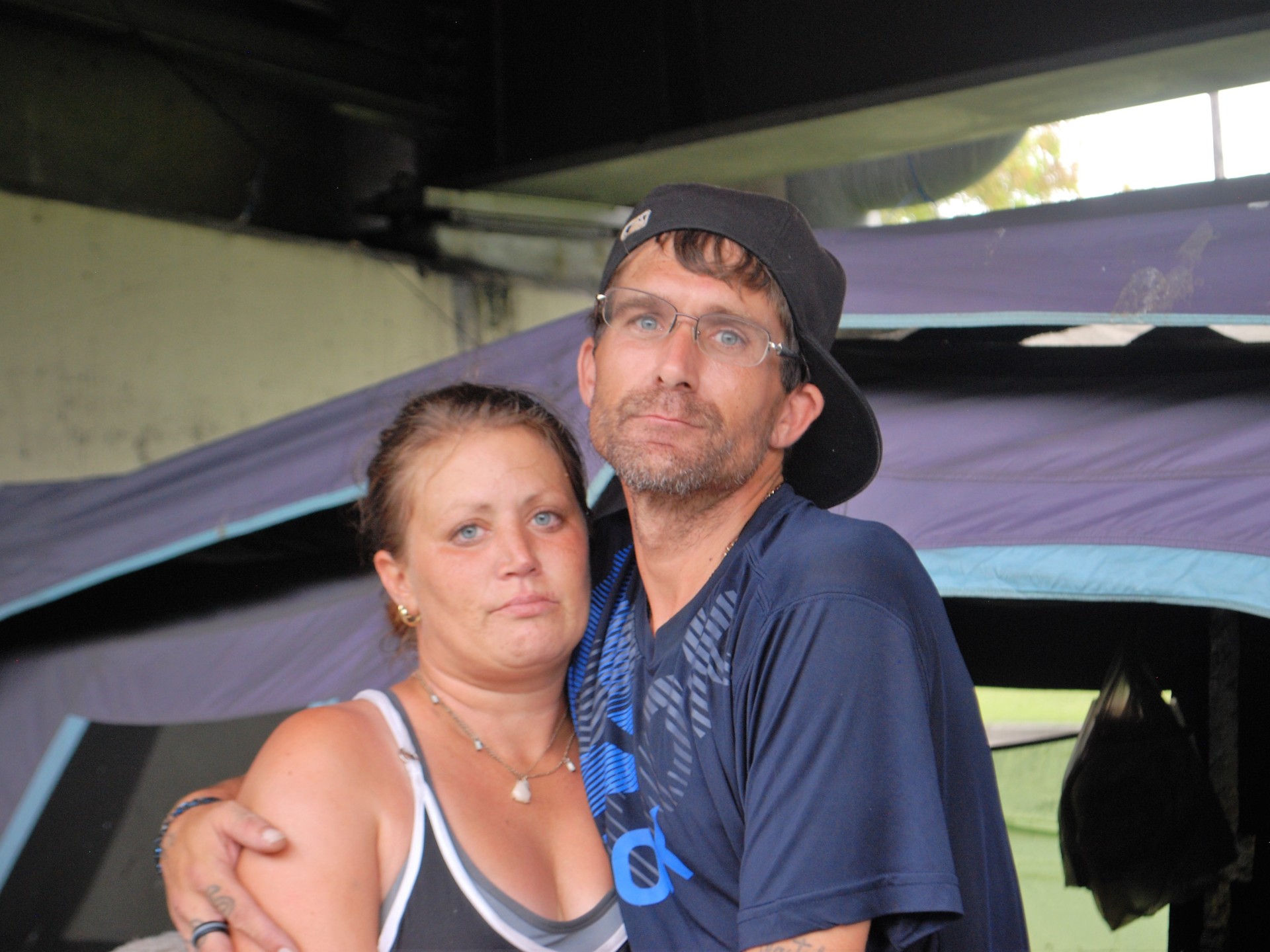Warning: This story contains references to suicide. If you or a loved one is experiencing suicidal thoughts, help is available. Visit Befrienders International for more information.
Listen to this story:
New Orleans, United States – Jessica Baudean and Terry Asevado are used to making every dollar count. For almost two years, they have lived in a tent on Calliope, a street in New Orleans where many people without houses reside. Recently, the couple moved into an apartment. But without a regular source of income and with few belongings, this has brought new and unexpected costs.
The couple met in rehab more than two years ago. Jessica was detoxing from heroin and Terry from suboxone. Two weeks in, they started chatting while smoking on the roof. They clicked immediately.
“Turned out we had a lot in common,” recalled Terry, who tends to be the quieter of the two. “We both had an addiction. We both went through some losses.” Terry’s mother took her own life in 2004. Jessica’s father overdosed on heroin in May 2020. Both had recently left abusive relationships when they met.
“We’d just been through the same things,” he added.
As romantic relationships are strongly discouraged in rehab, they decided to check out just five days after they met, so they could keep seeing each other.
It was too painful for Jessica to stay in the home she had shared with her father after he passed away, so the couple moved in with her mother. But she was using methamphetamine, and they found it difficult to maintain their sobriety there. So, after just a few months, they left. With nowhere else to go, they ended up on Calliope.
But on June 10 this year – Terry’s 42nd birthday – they finally moved into their own state-subsidised one-bedroom apartment.
“We’re so excited,” said 41-year-old Jessica on the morning of their move as she stood on the sidewalk outside the methadone clinic where they start each day. Jessica and Terry are on opioid substitution treatment and receive one methadone pill each morning to eliminate their cravings and withdrawal symptoms.
A volunteer from Southern Solidarity, a housing justice organisation, drove them to collect donated goods — bedding, toiletries and kitchenware — from a church and then on to their new home. “I can’t wait to make it feel like our own,” Jessica said.
New difficulties
But the move, while exciting, presented its own difficulties.
Apart from a futon, the couple did not own a stick of furniture. And their new apartment was located on the other side of the Mississippi River, meaning they would have to find a way to commute to the clinic each day. They don’t have a car and Jessica has lupus, an autoimmune disease, which causes her joints to hurt and leaves her unable to walk more than one block at a time. For about a year, she’s been using a wheelchair that she and Terry found on the sidewalk.
They both have Medicaid, state-backed health insurance for low-income people, which means they should be able to arrange a free shuttle to medical appointments, including their daily visits to the methadone clinic. But some days, Medicaid doesn’t have enough drivers to take them on the 50-minute return trip. When that happens, they must make the four or five-hour round trip on the bus, which costs a total of $8. If they make an extra stop for groceries, that rises to $12.
This affects how they plan everything. “Because if something happens with the Medicaid ride, we’ve got to have enough money to get where we got to go [like the clinic and Walmart], and then get back,” said Jessica.
They have also noticed that the prices of even the few items they buy — ice, store perishables, convenience shop food and cigarettes — have risen over the last year. “It’s very stressful,” Jessica reflected.
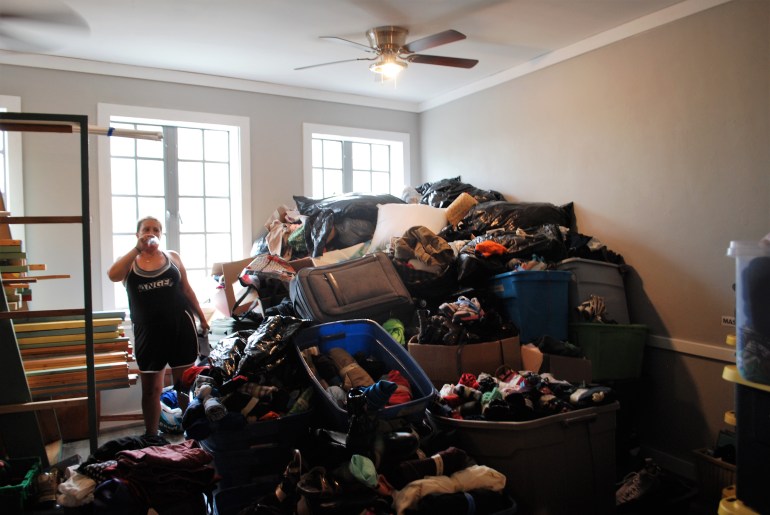
Rising rent
The rising cost of living affected their ability to find housing, too. Since Hurricane Ida last August reduced the available housing stock in New Orleans, rent has increased. There is now a shortage of affordable housing in Louisiana with the state in need of more than 105,000 affordable and available rental homes for “extremely low-income renters” according to the National Low Income Housing Coalition.
Rent has risen by 11.5 percent in New Orleans over the last year, making it even more difficult to find an apartment for a monthly rent of less than $950, the maximum Terry and Jessica’s housing voucher would cover. They also had to hold out for a place with electricity and water included in the rent, otherwise, they would be unable to afford utilities.
Getting the voucher, which is provided by the US Department of Housing and Urban Development, wasn’t easy. Terry and Jessica tried for months. To get one, a person must prove they have been continuously without a house for at least a year, or at least four separate episodes totalling 12 months in the past three years. They have to meet with caseworkers, and provide medical records and identity documents, all without a fixed address or income. The documents needed to qualify are regularly lost or destroyed by weather, strangers or periodic encampment “sweeps” – where the city’s health department, on short notice, often confiscates and destroys homeless people’s property, citing public health hazards, as old food and refuse around the encampments can attract rats. Voucher amounts are based on fair rents for an area and recalculated yearly, but as rents rise throughout the year, these calculations can lag behind.
Rising housing prices are responsible for growing homelessness and extended periods spent homeless, according to Angela Owczarek, an outreach worker with the local homelessness nonprofit organisation, Travelers Aid Society. “We have so many people sitting with vouchers in hand that would pay their rent, but nowhere is available for the voucher price. It’s a nightmare,” she explained.
Higher rents mean Calliope has gotten more crowded.
The area, near the Mississippi River, has long been a place where people experiencing homelessness set up encampments. The overpass above protects them from the weather, and centres that provide meals and showers are within walking distance. Dozens of tents — and occasionally objects from an indoor life, perhaps kept after an eviction: a couch, an armchair — line the sidewalk.
Anticipation
On that sweltering hot day in June, any worry the couple had about the future was eclipsed by anticipation as they set off to pick up donated household items. They are used to making the most of second-hand goods. “You’d be amazed what you find on the street,” Jessica said cheerfully.
They are constantly stitching together small plans for the future. Jessica wants to make a canopy for their bed from some pink fabric she found. Terry dreams of one day being able to afford his “favourite truck in the world,” a 2005 Toyota Tacoma.
But their new apartment would allow Terry to fulfil a more immediate dream — to cook for Jessica for the first time. He planned to make his favourite: pork-fried rice.
Shyly, and smiling, he explained that he hoped someday to be a step-dad to Jessica’s 13-year-old daughter, who currently lives with her grandmother on her father’s side.
Terry frets about Jessica’s health, which has declined sharply in the last few months. “I’ve been crying and everything. It gets to where she don’t even like telling me about it because I get so emotional,” he explained. “But I’m like, don’t ever hold back… it could mess with our relationship, hiding how you feel.”
They say they would not have survived the last few years without each other. “I would’ve gave up and just gone back to drugging and drinking,” Terry reflected. “It would’ve led to suicide.” Jessica thinks that without him she would have died from an overdose. They’re grateful to be together and sober.
The official housing services group Jefferson Parish Housing Authority (JPHA), which helped coordinate the couple’s application for housing vouchers, initially told them they’d receive a bed and a starter pack with essentials like towels and dishes. But later, Jessica said they told them they would only receive a mattress as the budget could not fit anything else.
At the church, Jessica and Terry browsed rooms full of donated goods. “Cleaning stuff!” Jessica exclaimed, picking up a sponge and a bottle of bleach. They carefully selected what they needed, wary of taking too much. They considered taking a pack of sports drinks Terry likes but ultimately put it back. “We don’t want to take more than we need,” Jessica said.
They took an air mattress, unsure when they would receive theirs from JPHA, and filled three boxes with pillowcases, blankets, sheets, groceries, plates, cups and soap.
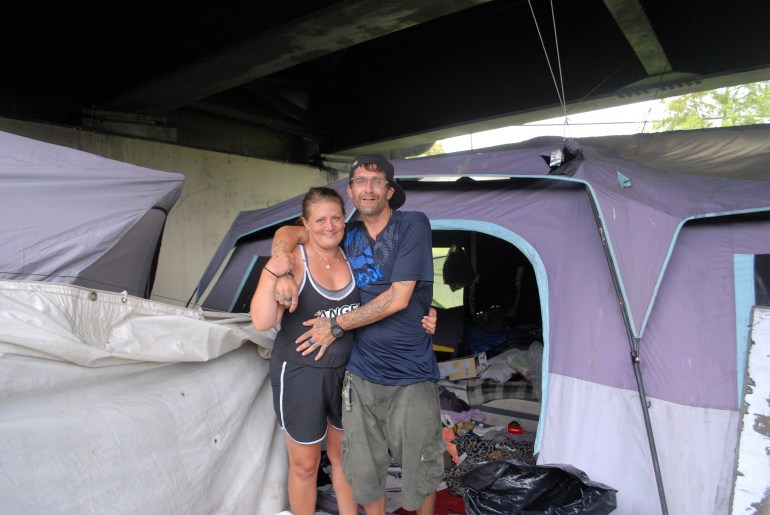
‘Flying a sign’
Up until a few years ago, Jessica worked serving coffee at a café. But these days, her lupus is too severe. Edema leaves her legs swollen, and fatigue and muscle stiffness prevent her from being on her feet all day. She plans to apply for government-administered disability benefits, a process that can take months. Terry has a felony conviction on his record, which makes it difficult for him to find employment, on top of the unaddressed trauma of being jailed for five years in the Allen Correctional Center and “Angola”, the largest maximum-security prison in the US. He is a certified small block engine mechanic, but he had not been looking for work while living on the street because they did not feel Jessica would be safe alone, particularly if work kept him away after dark.
The income they do get is from “flying a sign,” or panhandling. Jessica hates doing it, but with no other source of income, they typically do it once or twice a week. She’ll stand on a corner facing an intersection. People tend to give more to Jessica than Terry, so he spends that time running errands, or standing nearby to ensure Jessica is safe. Flying a sign comes with its own set of risks. Sometimes, Jessica gets aggressively solicited for sex work. So, she stops as soon as they get the amount they need. One morning after their move, in need of grocery money and bus fares, Jessica flew a sign for about two hours and made $75, which is better than usual. But they say people give less than they used to last year. “Definitely a lot less,” Terry said.
“Sometimes, someone would give me a $50 bill,” Jessica explained of the previous year. When that happened, she’d stop for the day. “I’d fold it up and stop right in front of them. I’d be like: ‘Thank you! I’m done!’”
They aren’t sure why people are giving less now. “I think people are just getting tired of seeing the same people out there over and over,” Terry speculated.
“They think everybody is the same,” Jessica added with frustration as Terry hummed small noises of agreement. “That if you’re out there, that you’re a piece of s**t, you’re not doing nothing. But you don’t know my situation. My health. Why I’m out here. Who passed away. All of our reasons. And it’s sad.”
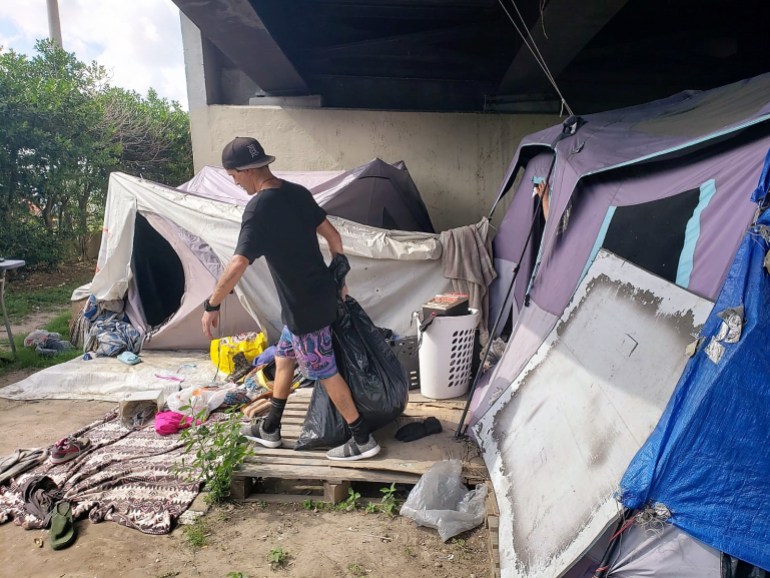
Packing up
After loading their new goods into the truck, Terry and Jessica headed to their tent to pack up their belongings. Their tent was carefully arranged under the shadow of the bridge on-ramp, tied in place with pieces of cord and reinforced in places by bits of blue tarp.
They dragged items out, separating what to keep from what to leave behind. They have no suitcases; most things go into black plastic bags. They left behind a stained mattress, some clothes and old food containers. They kept a pitcher, a battery-powered fan and a cooler to store food.
Jessica explained that the cost of ice for the cooler has gone up in the last few months. “You need to buy at least a bag of ice every day when you’re out there,” she added. “So the difference between 50 cents and a dollar makes a big difference.”
While living outside, they ate spicy tamales from a can or instant soup. Sometimes, passersby or organisations like Southern Solidarity would bring meals. Occasionally, they’d splurge on a treat. “He loves the coconut cream pies,” Jessica teased Terry. They can remember particularly good hauls — times when strangers dropped off cases of water, two large pepperoni pizzas (which they shared with their homeless neighbours), a bag of decent clothes. But moving into housing meant they wouldn’t have access to these donated meals anymore.
They said a brisk but friendly goodbye to their neighbours, James and Chris, both middle-aged, who have lived in tents around the Calliope area for a few years. Terry and Jessica wished them luck and invited them to take whatever was left of their belongings. But there was little worth keeping.
“The rats really was the worst,” Jessica reflected.
“And the rain,” Terry added.
“And not just that — people cutting their way into the tents, taking what they want,” Jessica said. As zippers make noise, people would slice open tents and take things while they were sleeping, she explained. The tents would be ruined and leave them more exposed to the elements and pests.
As they packed, a few rats ran out from behind the tent and around the corner.
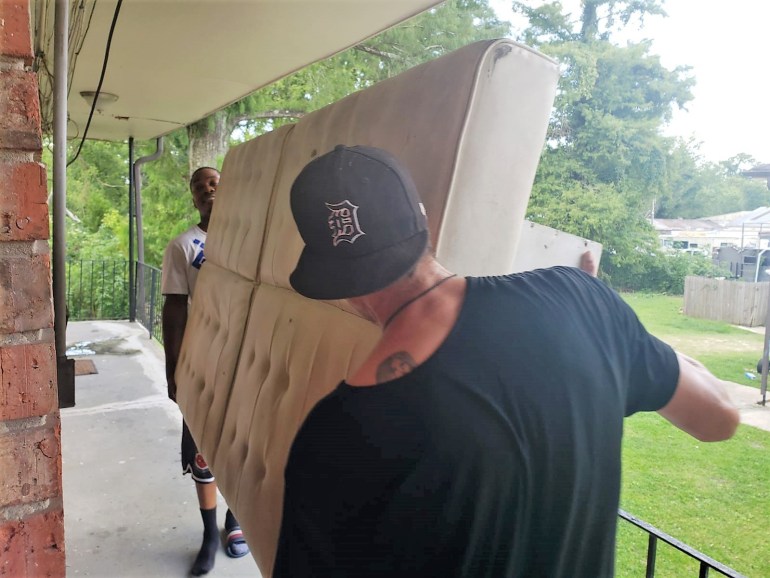
A new home
After waiting so long to get housing, Jessica and Terry signed the lease for their new place without seeing it first. They had thought, based on their case manager’s description, the place would be fairly central. But they drove past gas stations, the grocery store, a park, until there was nothing but trees on either side of the road, before reaching their new home. The apartment block was familiar to Jessica who grew up nearby. It sits on the side of an expressway next to a used auto parts lot and nothing else.
Jessica said there was a lot of drug activity at the complex and she was nervous about protecting their sobriety. She also worried about gun violence. But the most immediate issue was isolation. Their new apartment is 25 minutes walking distance from the nearest bus stop and there are no shops nearby.
Jessica headed to the second-floor apartment (the complex has no lift) to sit near the AC unit, strained and hot from the drive, while Terry lugged their things up the stairs and inside.
Owczarek says poor-quality units are often the only options for voucher holders. “This current cost-of-living crisis only magnifies the reality that as long as we leave people’s ability to live indoors up to the fluctuations of the economy, as opposed to guaranteeing that as a universal right, we won’t see change. Inflation only increases the width of the chasm between the price of housing and the ability of anyone — voucher holder or not — to afford it.”
Source of income discrimination is not prohibited in Louisiana, as it is in 20 other states, meaning landlords can refuse to accept housing vouchers from tenants. It took Jessica and Terry a month to find somewhere that would accept a housing voucher.
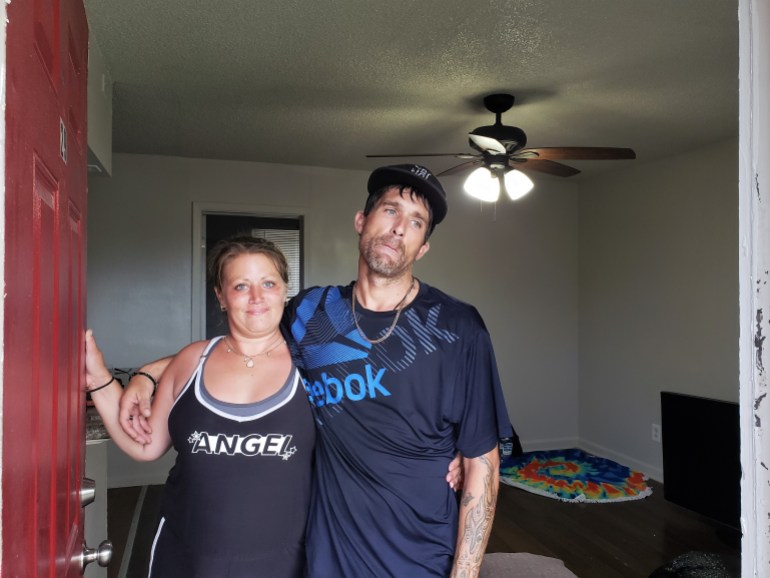
Balances ‘all the time’
Three months later, on a still September morning, Terry peeked behind the futon they had kept from the old tent, trying to coax out a kitten they had recently adopted. Jessica, though she felt sicker due to lupus, had lost the dark circles under her eyes. She had dyed her hair blue.
On many days they have to push Jessica’s wheelchair 25 minutes down the road, catch two buses across the river to pick up the methadone, fly a sign and get groceries at the Walmart near the clinic.
Jessica said she feels bad for Terry having to push her wheelchair but he waved off her concern. “It’s good for me,” he said reassuringly. “I like it.”
They get just under $700 per month in food assistance between the two of them, which includes a monthly $95 supplement each due to the COVID-19 crisis. It is unclear how long that supplement will continue. The food stamps are a big help, Jessica explained, but they don’t cover everything.
Food prices have gone up, they noted with frustration. Cans of evaporated milk, for example, are up from about $0.90 to $1.45. And food stamps only cover groceries, not hot food or any of the other purchases needed “when you’re trying to make it feel like home,” Jessica said. They bought decorations from a discount store, where prices went up in the last year from $1 to $1.25, Jessica noted. On one wall hangs a small wooden sign that says HOME in baby blue, with a shell for the “O”.
Somewhat bashfully, Jessica said that a JPHA representative who stopped by told them, “it looks good, it’s got that homey feel.”
They still don’t have all the things they need to cook: pans, bowls, tongs and many of their clothes will need to be replaced because they were ruined by the rats. And they cannot afford to buy over-the-counter medicine like anti-nausea and heartburn pills for Jessica, since they are so expensive. Her lupus symptoms, including heartburn, nausea, pain and swelling have grown more acute in the last months.
Toilet paper and soap, “stuff that you need just to get by,” said Jessica, have been getting incrementally more expensive, in ways that can be measured out in their particular arithmetic: an extra $2 for shampoo, for example, means one less bus fare.
They tally up balances in their head “all the time, all the time, all the time,” Jessica explained, shaking her head.
Making the best of it
They are confident, though, that they will manage.
When Jessica and Terry learned they would be getting an apartment, they knew they needed to save up funds to furnish it. So they switched from their brand of cigarettes, which went from $3.65 to $5, to rolling their own, saving $22 a month. “That saves a lot,” Jessica said with satisfaction.
Plenty of obstacles remain. Neither of the couple has a bank account. They need income and Terry, ever adept at making friends, has been offered a job at a discount store. But to accept the job, Terry needs to renew his expired ID, which costs $35. And to apply, they need to take a bus to do it in person. Jessica opened their wallet and counted out the money they had left: one, two, three dollar bills. Enough for the bus fare there, but not enough back.
Still, they were optimistic. Southern Solidarity had offered to cover the next day’s bus fare and ID fee. If they could save up a few hundred dollars, maybe they could find a used car. And someday soon, Jessica hopes she can get approved custody for visits from her daughter.
“She hasn’t come for a visit yet,” she said. “But we talk more now than we ever used to. Seeing her shouldn’t be too far off.”
This story is part of a series of portraits exploring how the cost-of-living crisis is affecting people around the world.
